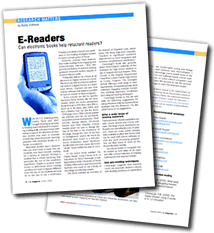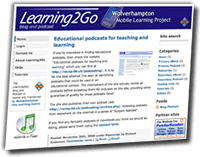 The Handheld Learning 2006 Conference was held October 12 and 13 in London, England. I had the pleasure of attending and presenting. This is the largest conference dedicated to handheld computing and learning I have ever attended. Nearly 600 conference-goers gathered at the Queen Elizabeth II Conference Center, right down the street from Buckingham Palace and Big Ben in Central London. Graham Brown-Martin and his team did a fabulous job organizing this event!
The Handheld Learning 2006 Conference was held October 12 and 13 in London, England. I had the pleasure of attending and presenting. This is the largest conference dedicated to handheld computing and learning I have ever attended. Nearly 600 conference-goers gathered at the Queen Elizabeth II Conference Center, right down the street from Buckingham Palace and Big Ben in Central London. Graham Brown-Martin and his team did a fabulous job organizing this event!
I presented a workshop, "Look What I Can Do For Free" that demonstrated many of the great freeware applications that are out there for handhelds. I focused on applications for the Palm OS, although it seemed most conference delegates are Pocket PC users. Those who use Pocket PCs can run most Palm applications using the StyleTap Platform.
As you know I like to do after conference, allow me to share some highlights from the two days. Here's information from Thursday, October 12:
- It was nice to see that the conference was supported by large companies like Microsoft, Apple, Palm, Samsung, and Fujitsu. The U.K. Department of Education and Skills also helped with the conference.
- Doug Brown, Head of Learning Technologies, Technology Group, says that sometime soon we will not be having conferences about computers. It's not like we have conferences for other tools like pencils. Doug tells the story that things besides the actual technology need to change. He told the story from 20 years ago where there was one computer in a classroom. He worked with educators and told one teacher that the computer could be used by students as they finish the lesson. The teacher said, "That won't work. Students do not move in my classroom." Though most teachers are past this attitude, there are more changes to make for mobile learning to be most useful to students. U.K.'s computer to pupil ratio is 6 to 1 for primary and 3.5 to 1 for secondary. It seems that 1 to 1 is the goal. However, most people have more than one computer. So, is 1 to 1 the right target?
- Professor Stephen Heppell presented the keynote address. His daughter recently became a teacher. If you take the processing power of all of the computers she had in primary school, that power is exceeded by one of today's mobile phones. Stephen posted an interesting slide that said, "In the next 30 years more children will leave school than in all history." What we do in schools in the next 30 years really does matter! Go to heppell.net for some videos of great learning projects called Be Very Afraid.
- Tony Parkin, Head of ICT Development, Specialist Schools & Academies Trust, made a great point. Like in the U.S., the U.K. has had many pilot projects with handheld learning. Tony says that with so many pilots, it's about time this plane gets off the ground! I've seen many pilot projects and I do hope that handhelds take off and go mainstream because I know what it's like to teach with a room full of them--rewarding, exciting, engaging, worthwhile, etc.
- Vanessa Pittard, Director of Evidence & Evaluation at Becta, presented about evaluating handheld learning projects in schools. She says we are learning a lot more about handheld learning, but there is still much more to learn. To expand handheld learning in schools, Vanessa says that in order for it to go mainstream, its results need to be repeatable. Right now most projects are in classrooms with teachers who are enthusiasts for technology or certain learning approaches. Vanessa explains that technology should not be a solution looking for a problem. Educators should identify problems and see what technology may be the solution.
- Professor Terry Russell, CRIPSAT, University of Liverpool, presented "Evidence for Efficacy: Some Thoughts." He uses the term "embedded" when referring to effectively and consistently using handheld computers. He showed several videos of handhelds being used by students. He showed a video of students video recording a P.E. class. The thing is that the class was playing floor hockey. Looked like a handheld disaster waiting to happen with the pucks and sticks going every which way! One of the benefits of handhelds going home, parents have a better connection with their children. The student can show exactly what they did in school right there on the handheld.
- "These Things We Know" by Professor Angela McFarlane, University of Bristol was presented via video link from Oslo. I was thrilled to learn that Futurelab will be publishing a Handhelds Handbook in the next few months. It will have information from school projects and research from 30+ projects. Angela explained that handheld computers can't just be dropped off one day and have your program be successful. Having a plan, technology support, and professional development are very important. It's difficult to manage small numbers of handhelds when there isn't one for each student. Those projects have not been as successful. Professional development time for learning to use a handheld is quite short. But time for collaboration with other handheld-using teachers has been found to be important. It's also important that the whole school support the project, even from those who are not involved with the project. This is especially important in secondary schools where teachers share students. Angela states something I always recommend: have spare devices around to swap in just in case a handheld breaks and needs to be sent away for repair.
- Graham Brown-Martin started his "From Here to Ubiquity" presentation with the assertion that by 2012 the desktop computer as we know it will be dead. We used Qwizdom handsets to instantly vote whether we agreed or disagreed with Graham's statement. It was really interesting to watch the graphs grow as we voted.
- The first day of the conference finished with an industry panel discussion with panelists from Microsoft, Apple, Symbian, Samsung, Sony, and Nokia. PSP. Chris Deering, the chair of the panel, asked the representatives of the companies about non compatibility among their devices. The person from Sony made a good point that the devices can all display file formats like jpeg photos and mpeg videos. Those are the types of files educators will need to stick to.
- Podcasts for each of the keynote sessions are available online.
The entire
program (or programme as the British spell it) is available online if you'd like to read about the conference presentations. The Handheld Learning Conference is an extension of the
Handheld Learning website and forums. Be sure to check out all of the conversations at this active site!
 Sunday, February 4, 2007 at 3:35PM
Sunday, February 4, 2007 at 3:35PM  Here's a new freeware math game for Palm and Windows Mobile users: ArithmeTick. The game helps student become faster at addition, subtract, multiplication, and division. Players can choose which operations will be used and the skill level. Once the game begins, it's a race to get as many problems correct as possible. Players are awarded up to 10 points for each problem depending on how quickly the problem was answered. Also, players are awarded extra time for each problem solved correctly. Challenge problems worth 50 points are offered at the end of each level. Since there is no erase button, you should know that if you enter a wrong number by mistake you can clear your current guess by tapping on the problem.
Here's a new freeware math game for Palm and Windows Mobile users: ArithmeTick. The game helps student become faster at addition, subtract, multiplication, and division. Players can choose which operations will be used and the skill level. Once the game begins, it's a race to get as many problems correct as possible. Players are awarded up to 10 points for each problem depending on how quickly the problem was answered. Also, players are awarded extra time for each problem solved correctly. Challenge problems worth 50 points are offered at the end of each level. Since there is no erase button, you should know that if you enter a wrong number by mistake you can clear your current guess by tapping on the problem. 







 The Wolverhampton Local Authority in the U.K. has been using Pocket PCs for a few years. They call their project
The Wolverhampton Local Authority in the U.K. has been using Pocket PCs for a few years. They call their project 
 The second day of the
The second day of the  I spoke about my five reasons for loving handheld computers. These include freeing the computer lab, teacher tools, free software, engaging activities, and animations. I've given this speech many times in the states, but this was first time abroad and by far the shortest time I've had to showcase why handhelds are great for teaching and learning. Aside from a few other speakers like Gerry Gray, I was the only one to really talk about hardware and software. In fact, most speakers emphasized that its not about the technology and all about learning. So true. However, teachers need to know the capabilities of the devices so they can plan learning activities! Most delegates didn't realize that they can run Palm OS applications using StyleTap and were very excited with what they saw. I wish I had more time to share other pieces of software.
I spoke about my five reasons for loving handheld computers. These include freeing the computer lab, teacher tools, free software, engaging activities, and animations. I've given this speech many times in the states, but this was first time abroad and by far the shortest time I've had to showcase why handhelds are great for teaching and learning. Aside from a few other speakers like Gerry Gray, I was the only one to really talk about hardware and software. In fact, most speakers emphasized that its not about the technology and all about learning. So true. However, teachers need to know the capabilities of the devices so they can plan learning activities! Most delegates didn't realize that they can run Palm OS applications using StyleTap and were very excited with what they saw. I wish I had more time to share other pieces of software.




